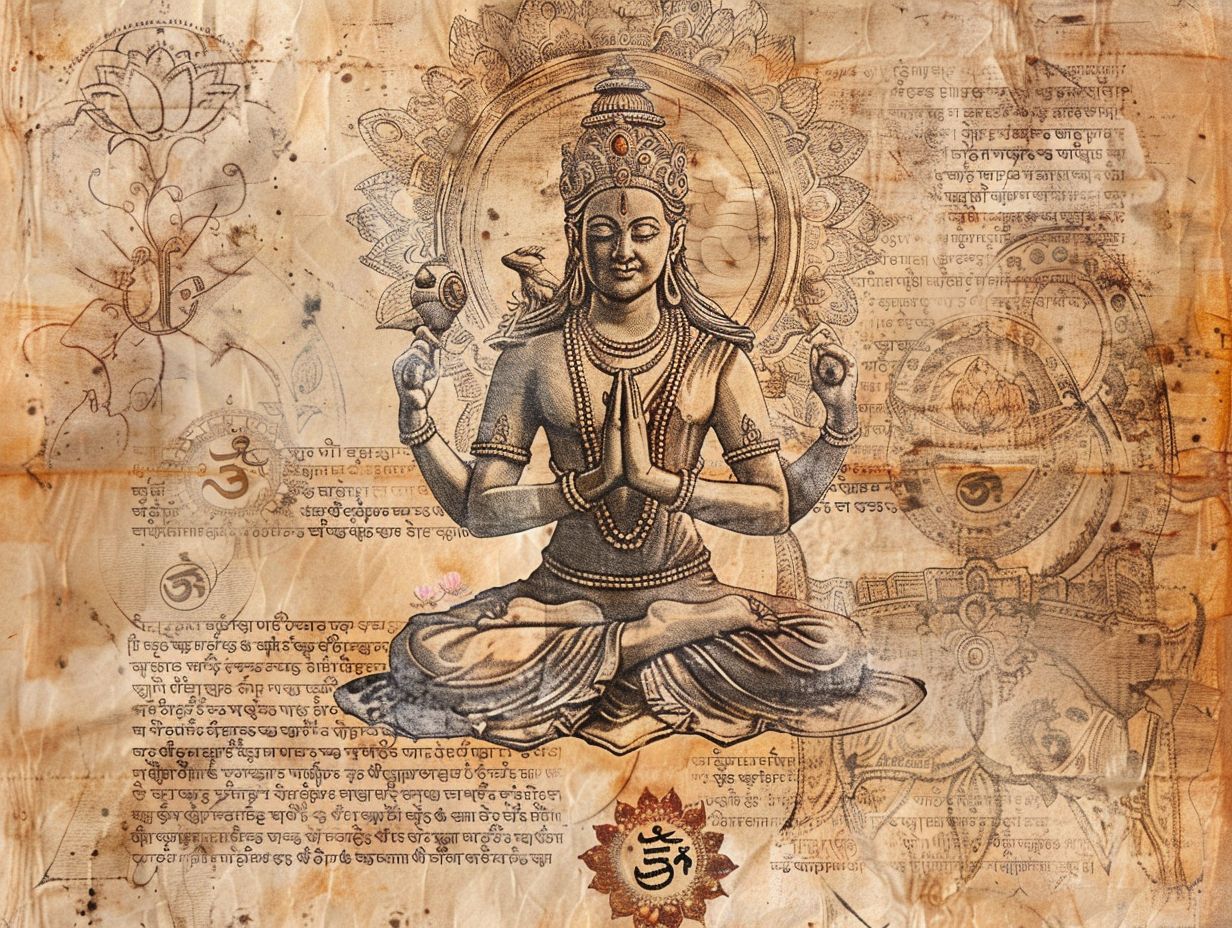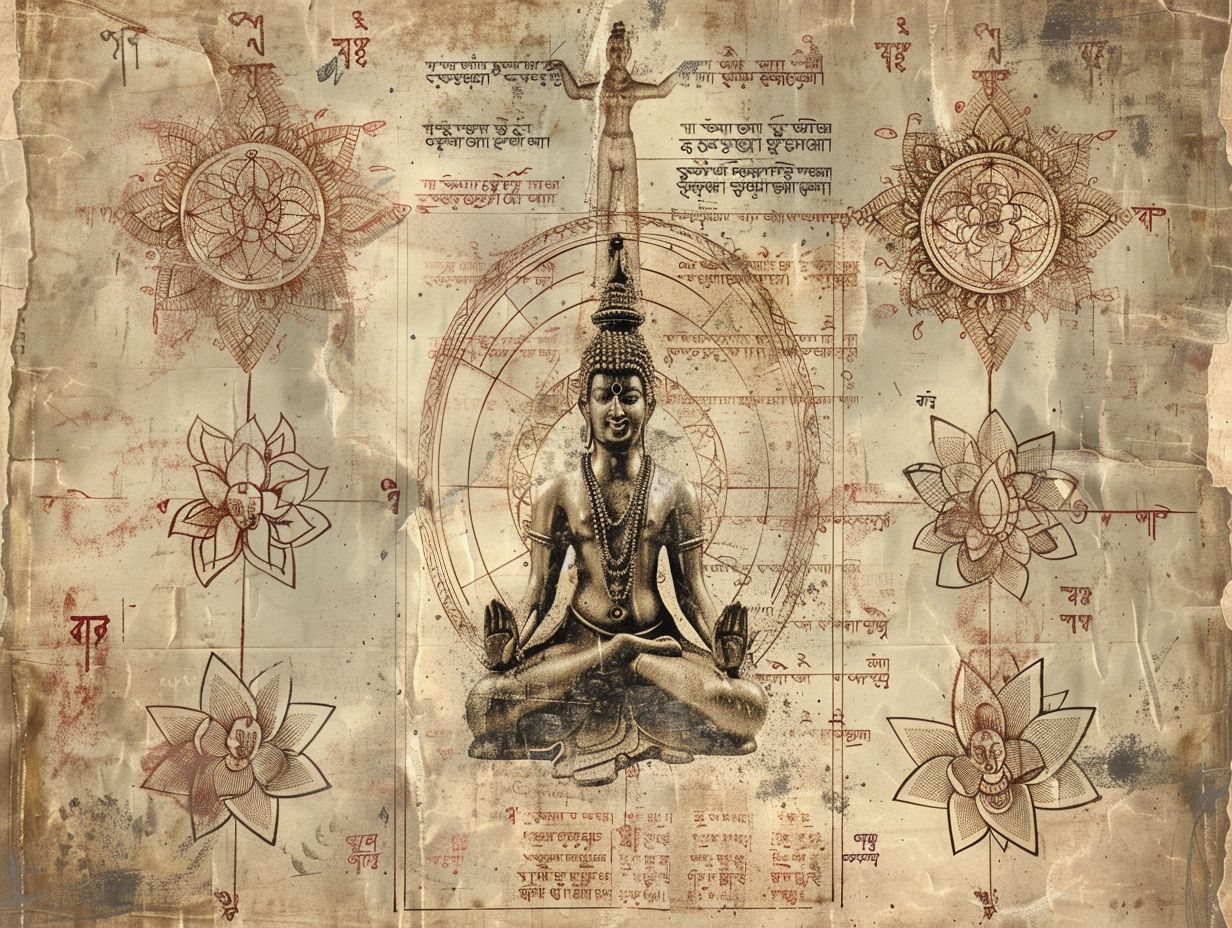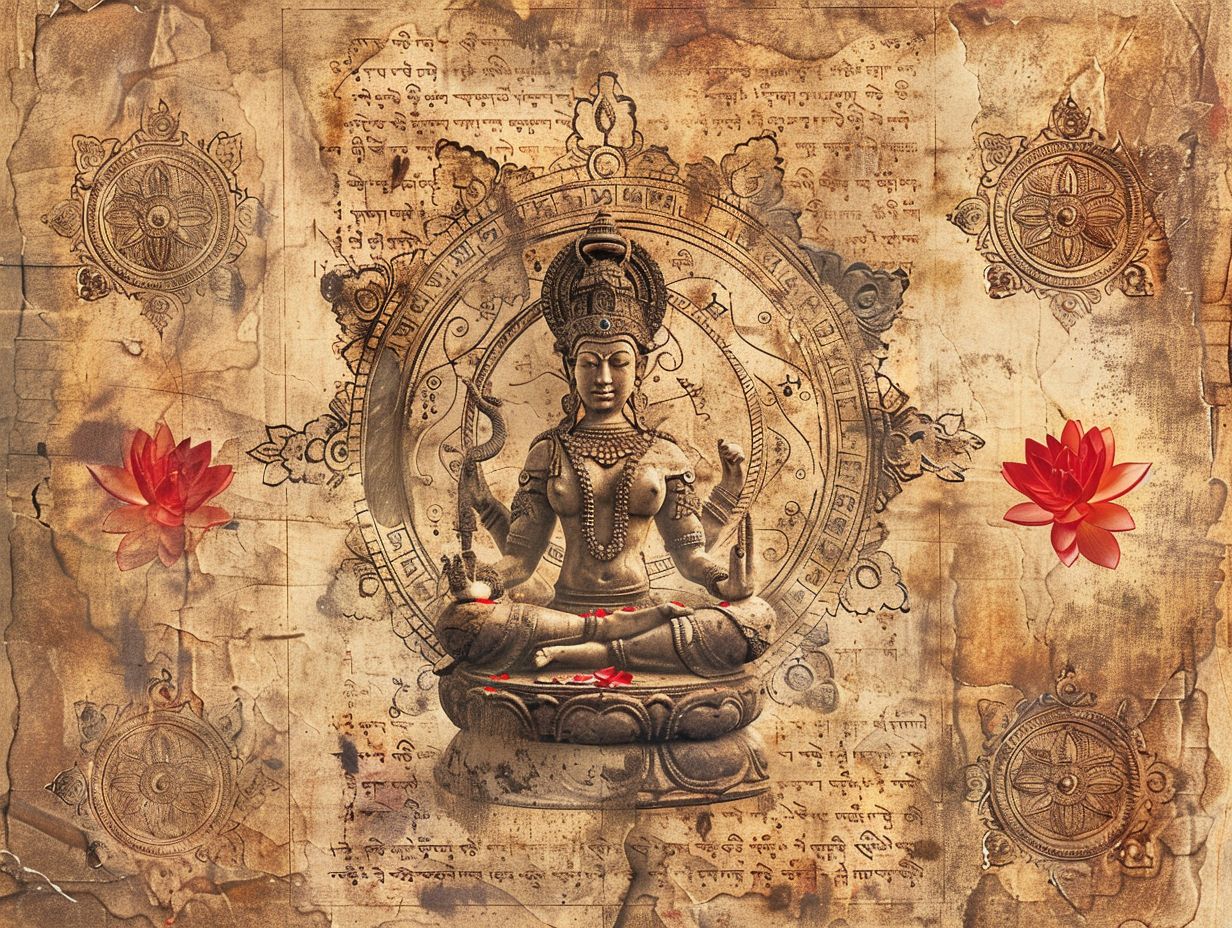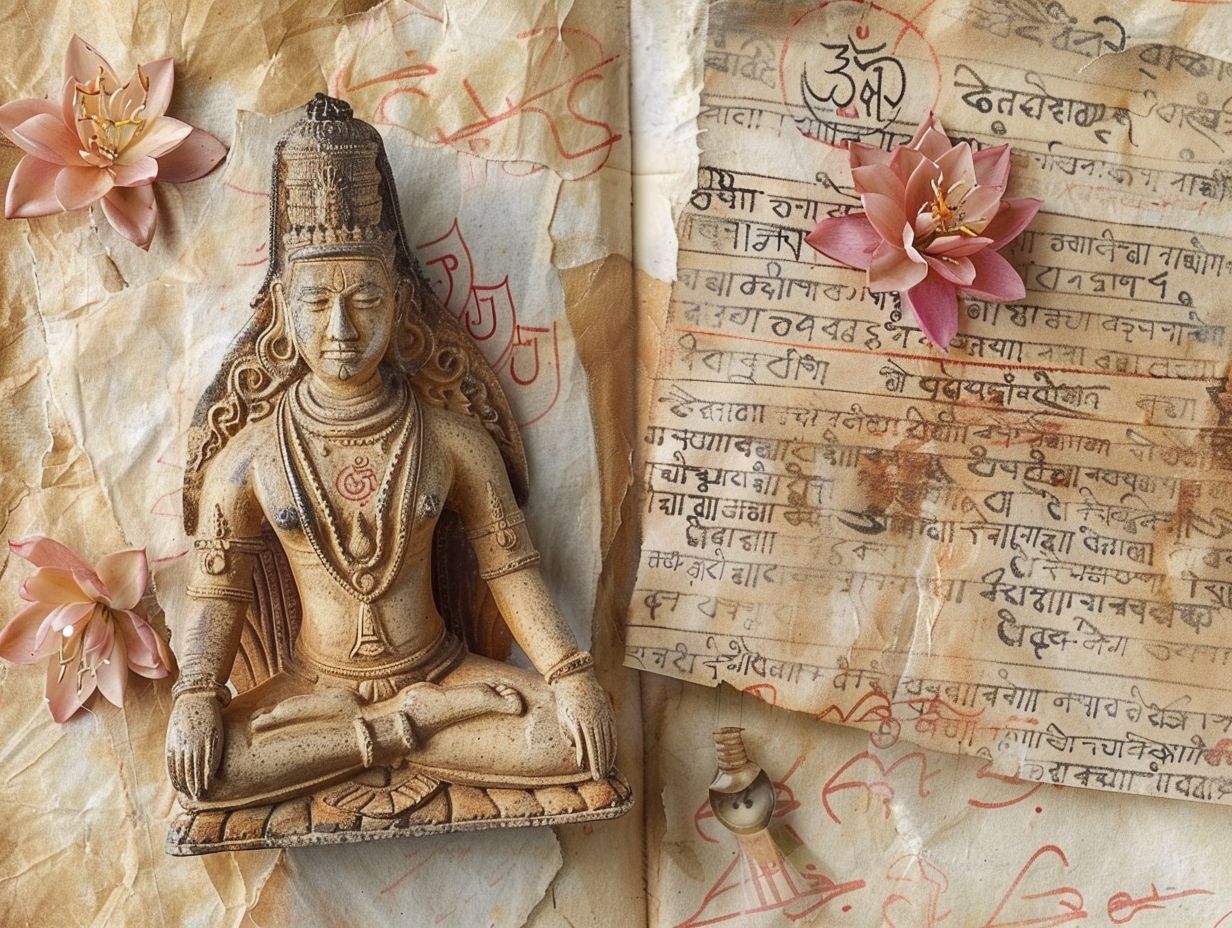Definition and Importance of Astika Darshanas in Hindu Philosophy
Astika Darshanas occupy a central position within Hindu philosophy, revealing profound insights into the nature of reality, self, and the universe.
Anchored in ancient texts, these six philosophies Samkhya, Yoga, Nyaya, Vaisheshika, Mimamsa, and Vedanta offer diverse pathways for understanding existence and attaining liberation.
This exploration delves into each of these darshanas, examining their significance and their contributions to a holistic understanding of ethics, morality, and the role of deities in Hindu thought.
Readers are invited to engage with the intricate tapestry of ideas that constitute this rich and profound philosophical tradition.
What Are Astika Darshanas?

Astika Darshanas constitute a vital dimension of Hindu Philosophy, encompassing a collection of six orthodox systems that offer an extensive framework for comprehending both the cosmos and spiritual wisdom, as illuminated by the profound teachings embedded in the Vedas and Upanishads.
These philosophical frameworks, originating from ancient India, delve into essential realms such as epistemology, metaphysics, and ethics, enabling individuals to reflect on existential inquiries while conducting a systematic exploration of reality’s nature. In doing so, they significantly influence personal worldviews and belief structures.
What Are the Six Astika Darshanas?
The six Astika Darshanas Samkhya, Yoga, Nyaya, Vaisheshika, Mimamsa, and Vedanta constitute the foundation of Hindu philosophical inquiry, encompassing a rich tapestry of metaphysical concepts and ethical teachings that have profoundly impacted spiritual exploration and religious thought.
Each of these systems offers distinct perspectives on the nature of reality, the self, and the pathways to liberation, collectively enriching the ongoing evolution of Hindu philosophy.
1. Samkhya
Samkhya stands as one of the most ancient philosophical systems within the Astika Darshanas, distinguished by its dualistic framework that elegantly differentiates between purusha (consciousness) and prakriti (matter). This distinction paves the way for a systematic exploration of the nature of reality and existence.
Beyond merely providing a foundation for understanding existence, this framework exerts a significant influence on contemporary philosophical discourse. By clearly delineating the contrast between the immutable consciousness and the dynamic material world, Samkhya offers profound insights into the intricate interplay between mind and matter.
The ramifications of these concepts reach far beyond the realm of metaphysics, forming the essential backbone of ethical teachings that illuminate behaviors aligned with a deeper understanding of the self and reality. As a result, the principles of Samkhya have permeated other philosophical traditions, particularly Yoga, which expands upon this dualistic perspective to examine avenues for liberation through self-realization and ethical living.
2. Yoga
Yoga, as delineated in the Astika Darshanas, transcends the confines of mere physical discipline; it embodies a comprehensive spiritual practice designed to facilitate self-realization and liberation (moksha) through disciplined effort and meditation.
In embarking upon this profound journey, practitioners delve into various forms and paths that significantly enrich their spiritual lives. Raja Yoga, often hailed as the royal path, places a paramount emphasis on mastering the mind and achieving mental clarity through rigorous meditation and ethical living. In contrast, Bhakti Yoga nurtures the heart s devotion, guiding seekers to express love and surrender to a higher power, thereby fostering a deep sense of connection and community.
Both paths are steeped in philosophical teachings that offer a robust framework for ethical conduct, ultimately directing individuals toward enlightenment and inner peace. This illustrates the myriad ways in which yoga can profoundly shape one s spiritual landscape.
3. Nyaya
Nyaya, a distinguished school of thought within the Astika Darshanas, places a strong emphasis on logical reasoning and epistemology as vital instruments for discerning truth and comprehending the nature of reality. This focus establishes a robust foundation for philosophical discourse within the Hindu tradition.
By prioritizing the methodologies of logical inference, the validation of knowledge through various means, and the significance of debate, Nyaya exerts a profound influence on the evolution of philosophical inquiry over time. Its principles provide a structured framework for evaluating claims, thereby fostering critical thinking and rigorous analysis.
In contemporary discussions surrounding epistemology and truth, the doctrines of Nyaya retain their relevance, encouraging a thorough examination of the processes involved in knowledge acquisition. This allows for an informed discourse that adeptly addresses both traditional and modern challenges in the quest to understand existence and belief.
4. Vaisheshika

Vaisheshika stands out as a unique philosophical system within the Astika Darshanas, engaging in profound metaphysical exploration. It categorizes existence into various substances, qualities, and actions, significantly contributing to the understanding of ontology and the nature of reality.
This meticulous classification serves as a foundational framework that facilitates a deeper inquiry into the essence of all that exists, forging connections with other philosophical traditions. By examining the fundamental categories of reality, Vaisheshika occupies a pivotal position in broader discussions of existence, where its ontology intersects with concepts from other schools of thought, such as Sankhya and Nyaya.
The systematic categorization provided by Vaisheshika not only enriches the discourse surrounding substance theory but also encourages scholars to explore the integration of these concepts across different philosophical perspectives. In doing so, it enhances the collective understanding of the intricacies of reality.
5. Mimamsa
Mimamsa, recognized as one of the fundamental Astika Darshanas, centers on the interpretation of scriptures and the execution of rituals, highlighting the significance of dharma (righteousness) in human behavior and the moral philosophy that underpins religious practices.
This philosophical framework advocates for a meticulous approach to textual analysis, urging practitioners to unravel the intricate layers of meaning embedded within ancient texts. By employing methodologies rooted in linguistic precision and contextual understanding, Mimamsa endeavors to reveal the intended ethical teachings contained in the scriptures.
Its influence transcends mere ritual observance; it serves as a vital pillar in the formation of Hindu belief systems by offering a rationale for moral conduct.
As adherents engage with these teachings, they are guided toward a profound understanding of their duties and responsibilities, thereby fostering a sense of harmony between individual actions and universal principles.
6. Vedanta
Vedanta, the concluding portion of the Vedas, represents a profound philosophical school within the Astika Darshanas, looking into the intricate concepts of Brahman (the ultimate reality) and Atman (the individual self). It advocates for non-dualism and the realization of the essential unity between these two entities.
Through its myriad interpretations, Vedanta has significantly influenced spiritual knowledge and established a framework for liberation from the cyclical nature of birth and death. The teachings highlight that a deep understanding of the relationship between Brahman and Atman is the pathway to enlightenment, enabling practitioners to recognize that their true essence is intertwined with the universal consciousness.
This realization cultivates a profound sense of interconnectedness and compassion, which resonates through diverse spiritual practices across various cultures. Vedanta’s insights have permeated philosophical discourse, sparking debates about the nature of reality, self-perception, and the ultimate objectives of human existence, thereby enriching the broader tapestry of global thought.
What Is the Importance of Astika Darshanas in Hindu Philosophy?
The significance of Astika Darshanas in Hindu philosophy is profound, as these systems offer vital frameworks for comprehending the nature of reality, the self, and the pathways to liberation. They enhance spiritual exploration and philosophical inquiry within the tradition, serving as essential pillars that navigate adherents through the intricacies of life, moral dilemmas, and existential inquiries.
1. Understanding the Nature of Reality
Astika Darshanas offer invaluable insights into the nature of reality, sparking philosophical inquiries that challenge existing beliefs and cultivate a profound understanding of existence and the cosmos.
Each of the six orthodox schools whether it is the meticulously analytical approach of Nyaya or the idealistic perspectives of Advaita Vedanta presents distinct metaphysical frameworks that delve into concepts of truth, knowledge, and existence. For instance, Nyaya emphasizes the significance of perception and inference as means of acquiring knowledge, while Advaita Vedanta introduces a non-dualistic reality that transcends empirical experiences.
This rich plurality in philosophical exploration not only enhances understanding but also invites critical reflection on the nature of self and the universe. It encourages seekers to navigate their own philosophical journeys amidst a tapestry of diverse perspectives.
2. Providing a Path to Liberation

Astika Darshanas articulate a tapestry of paths leading to liberation (moksha), providing individuals with a rich array of approaches to transcend suffering and attain spiritual enlightenment. Through a meticulous exploration of ethical teachings, self-realization, and disciplined practices, these traditions offer profound insights into the human experience.
Each philosophical system within these schools contributes distinctively to the singular objective of achieving moksha, showcasing a spectrum of methodologies and perspectives. The intricate understanding of karma within Samkhya philosophy contrasts with the deep devotion found in the Bhakti movement; despite their differences, these paths complement one another beautifully.
Practitioners are invited to immerse themselves in ethical principles, recognizing that moral behavior is the cornerstone of spiritual development. This dynamic interplay between ethical conduct and spiritual inquiry is vital, serving as a compass for seekers striving to dismantle the chains of ignorance that ensnare them, ultimately guiding them toward a state of liberation.
3. Exploring the Concept of Karma
The concept of karma holds a central place in the Astika Darshanas, elucidating the profound ways in which actions and intentions shape one s destiny. This principle serves as a guiding force, illuminating the ethical teachings that lead individuals toward righteous living and spiritual growth.
As a foundational moral compass, karma encourages adherence to virtues such as truthfulness, compassion, and self-discipline. Various interpretations within these philosophies highlight the importance of intentionality behind actions, drawing a clear distinction between thoughtless deeds and those executed with mindfulness.
By grasping the implications of karma, practitioners are give the power toed to make more informed moral decisions that yield positive outcomes not only for themselves but for society as a whole. As contemporary discussions on ethics continue to evolve, the influence of karma remains profoundly relevant, urging individuals to reflect on the long-term consequences of their actions. This ongoing dialogue enriches ethical discourse within modern spiritual practices.
4. Studying the Nature of the Self
Astika Darshanas offer a profound exploration of the nature of the self (Atman), investigating its intricate relationship with the ultimate reality (Brahman) while looking into the processes of self-realization that pave the way for spiritual awakening. These philosophical frameworks present a spectrum of interpretations regarding the self, illustrating how a deeper understanding of Atman can catalyze significant personal transformation.
Through practices such as meditation, ethical living, and philosophical inquiry, individuals embark on spiritual journeys that allow them to peel back the layers of ignorance and attachment that obscure true enlightenment. Each darshana, whether it be Vedanta or Samkhya, provides distinct methodologies aimed at cultivating awareness, effectively guiding seekers toward a more unified experience of existence.
As practitioners engage with these teachings, they are encouraged to reflect on their personal narratives, striving to align their inner lives with the greater cosmic order. In this pursuit, they ultimately come to realize their profound connection to Brahman.
5. Understanding the Role of Deities
The role of deities within the Astika Darshanas is remarkably intricate, serving not merely as focal points for spiritual exploration but also as embodiments of the divine principles that underpin the ethical teachings and philosophical discourse within Hinduism.
These divine figures act as exemplars of moral virtue, adeptly guiding individuals through various dilemmas and challenging them to adhere to ethical standards that promote societal harmony. By invoking these deities, practitioners discover a wellspring of inspiration, reflecting on their attributes and narratives as they contemplate their own life choices. The rich tapestry of cultural heritage that envelops these deities deepens the understanding of moral frameworks, fostering a profound sense of belonging and identity.
Through rituals, prayers, and meditative practices centered on these sacred beings, individuals embark on transformative spiritual journeys that significantly shape their personal ethics and enhance their community relationships.
6. Examining Ethics and Morality
Examining ethics and morality through the lens of Astika Darshanas unveils the intricate philosophical frameworks that underpin righteous living and moral decision-making within Hinduism, highlighting the complex interplay between duty (dharma) and personal conduct.
This exploration transcends mere theoretical constructs, illuminating how these teachings resonate with contemporary societal dilemmas and individual choices. Each school of thought, from the nuanced perspectives of Nyaya and Vaisheshika to the devotional emphasis prevalent in Bhakti traditions, presents unique insights into ethical behavior and just conduct.
By looking into these diverse teachings, individuals can gain a deeper appreciation for their significance in navigating personal dilemmas and understanding the broader ethical landscape of society. Consequently, the relevance of these ancient philosophies remains profoundly significant today, as they continue to guide individuals in making morally sound decisions that foster communal harmony and promote social justice.
7. Preserving Ancient Knowledge and Traditions

The Astika Darshanas serve an essential function in the preservation of ancient knowledge and traditions, ensuring that their rich philosophical legacies are transmitted to future generations. They foster a continuous dialogue regarding the relevance of these teachings in contemporary society.
Rooted in the foundational principles of Hindu thought, these philosophical systems provide invaluable insights into ethics, metaphysics, and the nature of existence. By engaging with these teachings, individuals not only pay homage to the cultural heritage of their ancestors but also contribute to a broader discourse on spirituality that remains significant in today s world.
The ongoing study and interpretation of the Astika Darshanas promote critical thinking and introspection, enabling practitioners and scholars to explore how these ancient teachings can effectively address contemporary dilemmas. In this manner, the preservation of these traditions sustains a vibrant intellectual landscape where ancient wisdom enriches modern life and cultural identity.
Frequently Asked Questions
What are Astika Darshanas in Hindu Philosophy?
Astika Darshanas are the six major schools of Hindu Philosophy that accept the authority of the Vedas and believe in the existence of a supreme being. These schools include Samkhya, Yoga, Nyaya, Vaisheshika, Mimamsa, and Vedanta.
Why are Astika Darshanas important in Hindu Philosophy?
Astika Darshanas play a crucial role in understanding the fundamental concepts of Hinduism, such as the nature of reality, the purpose of life, and the concept of God. These schools of thought also provide a framework for spiritual practices and guide individuals in their spiritual journey.
How do Astika Darshanas differ from each other?
Although all Astika Darshanas accept the authority of the Vedas, they have distinct beliefs and perspectives on various philosophical concepts. For example, while Samkhya focuses on the dualistic nature of reality, Vedanta emphasizes the non-dual nature of reality.
What is the significance of the Vedas in Astika Darshanas?
The Vedas are considered the most sacred and authoritative texts in Hinduism, and they form the basis of all Astika Darshanas. These schools of thought use the Vedas as a primary source to understand the nature of reality, the purpose of life, and the concept of God.
How do Astika Darshanas influence Hindu society?
Astika Darshanas have had a significant impact on Hindu society, shaping its religious, social, and cultural practices. For instance, Yoga has influenced the practice of meditation and physical postures, while Nyaya has influenced the development of logical reasoning and debate in Hindu society.
Are Astika Darshanas still relevant in modern times?
Yes, Astika Darshanas continue to have a significant influence on Hindu philosophy and society. The principles and teachings of these schools of thought provide guidance and understanding for individuals seeking spiritual growth and a deeper understanding of the world around them.
